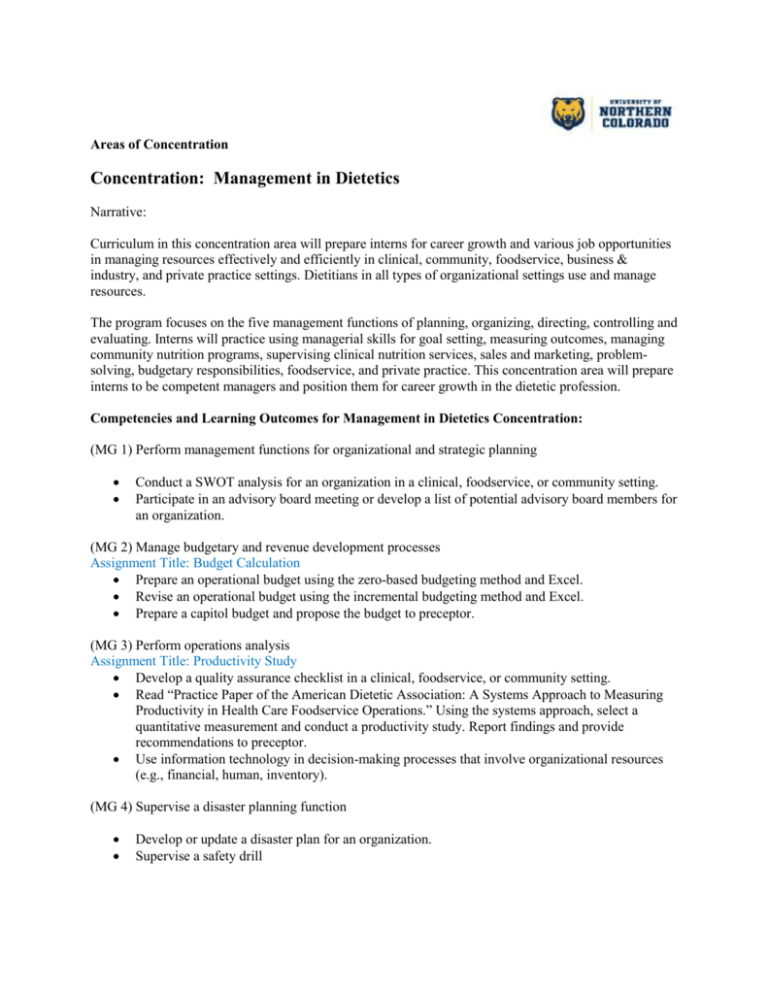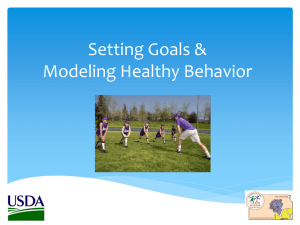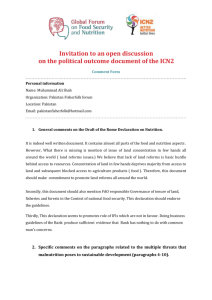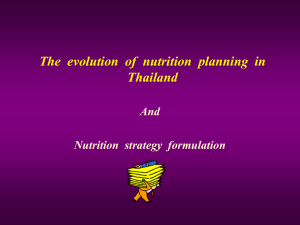CRD Area of Concentration
advertisement

Areas of Concentration Concentration: Management in Dietetics Narrative: Curriculum in this concentration area will prepare interns for career growth and various job opportunities in managing resources effectively and efficiently in clinical, community, foodservice, business & industry, and private practice settings. Dietitians in all types of organizational settings use and manage resources. The program focuses on the five management functions of planning, organizing, directing, controlling and evaluating. Interns will practice using managerial skills for goal setting, measuring outcomes, managing community nutrition programs, supervising clinical nutrition services, sales and marketing, problemsolving, budgetary responsibilities, foodservice, and private practice. This concentration area will prepare interns to be competent managers and position them for career growth in the dietetic profession. Competencies and Learning Outcomes for Management in Dietetics Concentration: (MG 1) Perform management functions for organizational and strategic planning Conduct a SWOT analysis for an organization in a clinical, foodservice, or community setting. Participate in an advisory board meeting or develop a list of potential advisory board members for an organization. (MG 2) Manage budgetary and revenue development processes Assignment Title: Budget Calculation Prepare an operational budget using the zero-based budgeting method and Excel. Revise an operational budget using the incremental budgeting method and Excel. Prepare a capitol budget and propose the budget to preceptor. (MG 3) Perform operations analysis Assignment Title: Productivity Study Develop a quality assurance checklist in a clinical, foodservice, or community setting. Read “Practice Paper of the American Dietetic Association: A Systems Approach to Measuring Productivity in Health Care Foodservice Operations.” Using the systems approach, select a quantitative measurement and conduct a productivity study. Report findings and provide recommendations to preceptor. Use information technology in decision-making processes that involve organizational resources (e.g., financial, human, inventory). (MG 4) Supervise a disaster planning function Develop or update a disaster plan for an organization. Supervise a safety drill (MG 5) Supervise human resource functions Assignment Title: Job Description Develop an in-service training program or job aid for supervisors on laws and regulations pertinent to hiring, managing, and dismissing employees. Write a job description for a position in a clinical or foodservice setting. . (MG 6) Manage private and entrepreneur functions Assignment Title: Business Card Design a personal business card. Write a mission statement for a business you might consider starting as a private practice. Research state laws governing small businesses. Select either an incorporated or unincorporated business structure and write a short summary on why you may want to use this structure for a private practice. Create a brochure or material marketing a service to a target audience. (MG 7) Supervise marketing function Assignment Title: Marketing Plan Develop an organizational marketing plan for a targeted population. Define the target market and the marketing mix. Areas of Concentration Concentration: Nutrition Education and Counseling in Dietetics Narrative: Today’s dietetic professional must be able to identify, design and develop effective nutrition education materials and learning experiences. They also need confidence in using nutrition counseling strategies for intervention. When dietitians provide effective education and have successful counseling skills, they can influence lifestyles and initiate behavior change. Interns will practice identifying effective and non-effective education materials, assessing nutrition education needs, designing and developing nutrition education materials and counseling patients/clients. Content in this concentration area will prepare interns to use assessment, learning objectives, instructional strategies, and development processes wisely when providing nutrition education. Interns will also have opportunities to enhance their skills in conducting nutrition interviews and setting goals with individuals. An emphasis in nutrition informatics will help interns use educational strategies that are both attractive and effective for children, patients, clients, and consumers living in a technology driven society. Competencies and Learning Outcomes for Nutrition Education and Counseling in Dietetics Concentration: (ED 1) Demonstrate skills in evaluating and selecting effective education materials Assignment Title: Internet Site Evaluation Handout Develop a handout for identifying good and bad Internet sites for consumer education. Identify good and bad nutrition education materials for consumers (e.g., evaluating free materials from commodity groups, business and industry, and other free resources available to dietetic educators). Supervise the use of federal nutrition materials by assessing MyPyramid materials and discussing with preceptor the best way to use the materials for a target population. (ED 2) Perform a nutrition interview/assessment for individual counseling and education Demonstrate effective skill in building rapport with patients/clients. Demonstrate effective skill in assessing and determining patients’/clients’ readiness for change by using motivational interviewing, the transtheoretical model or other counseling approach. (ED 3) Provide nutrition counseling to individual patients/clients Demonstrate effective skills in preparing for counseling sessions, conducting nutrition interview/assessments, setting goals with patients/clients, conducting interventions with education and evaluating counseling outcomes. Counsel a patient/client in at least two counseling sessions and evaluate outcomes and progress over time. (ED 4) Assess, design and develop nutrition education materials Assignment Title: Needs Assessment/Learning Objective-Clinical Assignment Title: Needs Assessment/Instructional Materials-Wellness Conduct a needs assessment and write learning objectives for a nutrition education program targeted at adults in a clinical setting. Conduct a needs assessment, write learning objectives, determine content and develop an instructional material for patients/clients in a wellness or health and fitness setting. (ED 5) Manage the implementation function for nutrition education Assignment Title: Needs Assessment/Lesson Plan/Class-K-12 Modify at least two recipes and give a culinary education program to encourage behavior change. Design, develop and conduct a lesson plan for a unit of instruction in a K-12 school setting. The lesson plan should include a needs assessment, topic, target audience (grade level), time required, learning objectives, materials, teaching method(s), content outline, evaluation method to assess learning, and references. (ED 6) Demonstrate proficiency in using online resources and nutrition informatics for implementing nutrition education Demonstrate competency in using images and graphics effectively in nutrition education. Demonstrate knowledge of copyright laws. Demonstrate competency in using the SMOG or similar readability formula for nutrition education materials targeted at patients, clients and the general population. Use information processes and information technology effectively in retrieving and selecting resources used in nutrition education. Use information technology tools effectively in communication and education functions. (ED 7) Manage evaluation functions Assignment Title: Computer Game Evaluation Conduct a summative evaluation for a computer-based nutrition game designed for children. Ask children to play the game and report if the game met objectives and increased their knowledge of nutrition.







